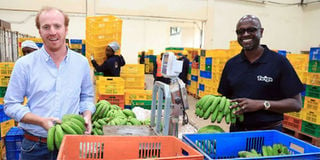
Twiga Foods outgoing boss Peter Njonjo.
As is usually the case with founder departures, when Peter Njonjo last week bowed out of the firm he co-founded a decade ago, the news made rich fodder for corporate gossip. There was speculation about what Twiga Foods would look like without the name, face and personality that has been synonymous with the agri-tech firm since its inception.
The build-up to last week’s eventuality had been signalled about a fortnight ago when the ex-Twiga boss announced that he would be proceeding on a six-month sabbatical, with analysts at the time widely interpreting the disclosure as the opening salvo to an unfolding founder transition at one of Kenya’s most celebrated tech start-ups.
The leave pronouncement came just weeks after the firm had bagged a new round of funding to the tune of $35 million (Sh5.5 billion), which added onto the $160 million (Sh25.1 billion at current exchange rates) cumulative capital raised since inception, with sources indicating Njonjo’s exit had been imposed by investors as a pre-condition for the extension of the equity facility.
“From what I gather, Mr Njonjo's leave follows an intensive transformation at the company spearheaded by its investors namely, Creadev and Juven, the two institutions who led in the latest funding round,” wrote newspaper columnist Jaindi Kisero a day after Njonjo’s sabbatical was made public.
“A well-informed source told me that the recent funding round was only made available by investors after the company completed a transformation and restructuring drive, the centerpiece of which was a 40 percent reduction in the company’s cost base.”
As the face of the company, Mr Njonjo has in recent times been flung into the eye of the storm, oftentimes battling to water down controversial media reports as Twiga ran into back-to-back operational headwinds, ranging from staff layoffs to deferred payments for suppliers as well as delayed salaries.
The turbulences at Twiga worked to send jitters in the country’s start-ups sector based on its presumed position as a market leader on whose success novel players would have banked as a benchmark.

Former Twiga Foods Chief Executive Officer Peter Njonjo during an interview in August. PHOTO | LUCY WANJIRU | NMG
The dramatic step-down came as a surprise as Mr Njonjo had, in a wide-ranging interview with the Business Daily last August, spelt out his operational strategy to steer the turnaround of the fortunes at the firm which at the time appeared to have started its downhill path after it issued redundancy notices to more than 30 percent of its entire workforce.
At the time, he had projected that the firm would take at least 12 months to achieve profitability and get back on sound footing.
The move to take a back seat is set to offer the ex-CEO the much-needed relief from public scrutiny as he also battled his own fair share of personal troubles away from Twiga’s distresses.
A Business Daily expose in August last year revealed that Mr Njonjo had transferred up to 20,000 acres handed to Twiga by President William Ruto’s administration in the Galana-Kulalu scheme to his private company named Selu.
Mr Njonjo had previously claimed that Selu was a foreign firm that was overseeing over 600,000 acres of farmland in Latin America, making it the best-suited firm to run operations at Galana.
The Business Daily report, which came at a time Twiga was battling to restore investor and public confidence, however, revealed that Njonjo was registered as the sole shareholder of Selu, owning all the 500 ordinary shares while a Ms Enid Kathambi held the post of company secretary with zero shareholding, findings that the ex-CEO did not refute.
“Yes, I’m currently the only director at Selu Limited but I’m working to onboard more shareholders and will give an update in a month’s time,” he said in a text response at the time.
A hold of a Bachelor’s degree in international business administration from the United States International University (USIU)-Africa, Mr Njonjo has decent portion of shining moments in the course of his corporate career.

Twiga Foods founder Grant Brooke [L] with CEO Peter Njonjo in Nairobi. PHOTO | JEFF ANGOTE | NMG
His LinkedIn profile indicates that he joined multinational soft drinks producer Coca-Cola East and Central Africa in 1998 and rose through the ranks to hold the general manager’s post in 2011, before heading to the beverage maker’s West African market as president in 2016.
In 2013, he partnered with Texas-born Grant Brooke to co-found Twiga, which unveiled an e-commerce platform that aggregates the requirements of informal food retailers in the local market and leverages the data to source for produce directly from farmers and food manufacturers.
Mr Brooke started off as the founding CEO before stepping down from the role in 2019 and handing over the reigns to Njonjo.
The former would later step back from active management of the firm in January 2020, indicating that he would only remain on the company’s board of directors.
The B2B firm is backed by a range of investors who include Juven AHL Venture Partners, Creadev, Omidyar Networks and Genevieve Capital, all of whom now assume control of the company after the exit of the original founders.
Mr Njonjo has committed, as the third largest investor after Creadev and Juven, to continue playing the role of ‘a supportive shareholder’.
He says as a founder, he invested $1 million (Sh157 million) in August last year and intends to pump a similar amount in coming weeks if the company attains certain goals.









